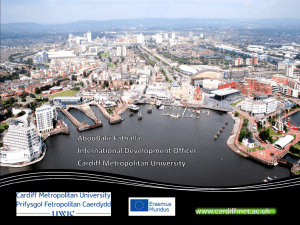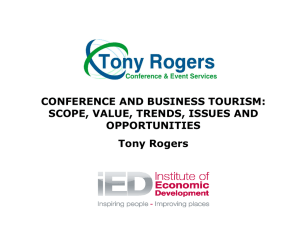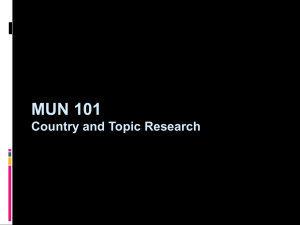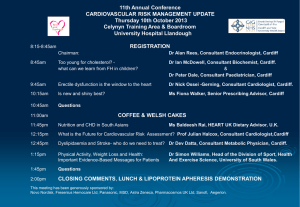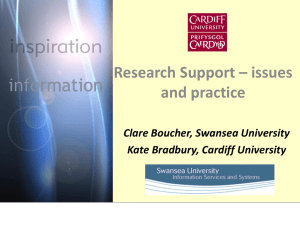2006 Conference Report
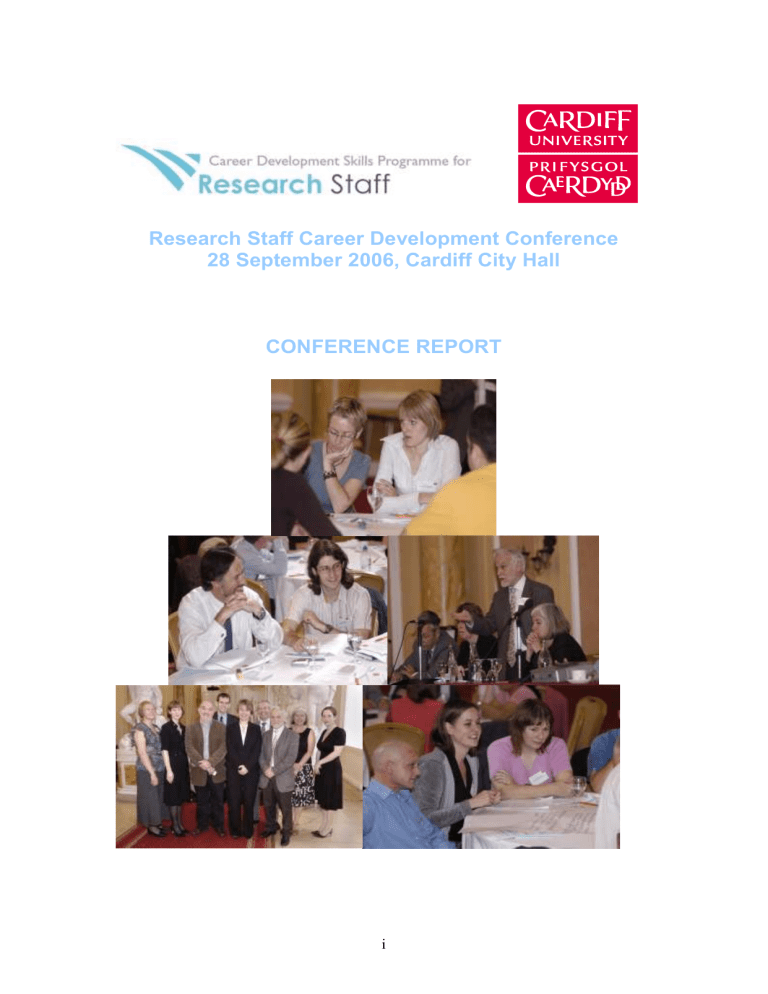
Research Staff Career Development Conference
28 September 2006, Cardiff City Hall
CONFERENCE REPORT
i
Research Staff Career Development Conference
28 September 2006, Cardiff City Hall
Conference Report
TABLE OF CONTENTS
1. INTRODUCTION
2. CONFERENCE AIMS
3. REPORTING BACK
4. CONFERENCE THEMES
5. RESEARCH STAFF POLICY AND DEVELOPMENTS
6. DELEGATE FEEDBACK
7. CONCLUSIONS AND ACTION POINTS
APPENDICES
A. Conference Statistics
B.
Conference Programme
C . Questions to the panel
D.
Feedback Form
2-5
5-7
8-9
9-10
11-18
12
13-14
15-16
17-18
1
1
1 ii
1 INTRODUCTION
1.1 In recent years Cardiff has expanded the range of staff development opportunities available for its research staff population. This is partly in response to a UK-wide drive to improve the provision of support for researchers in developing their transferable and career development skills, a drive most clearly evidenced in the 2002 Roberts Report
‘SET for Success: The Supply of People with Science, Technology,
Engineering and Mathematics Skills ’. This report resulted in the UK
Government allocating ring-fenced funds to Universities for the transferable skills training of their research staff and students (‘Roberts money’). It is, however, also part of the University’s wider commitment to improving the career development opportunities and structures in place to support its research staff. The 2006 Research Staff
Conference, which is discussed at length in this document, was one of the events financed with the funds designated for assisting research staff in their career development.
1.2 The second Cardiff University Research Staff Career Development
Conference was held at Cardiff ’s City Hall on September 28 th 2006 and attracted 113 members of research staff. Plenary speakers were drawn from the senior staff of the University and Research Councils UK
(RCUK). Speakers in the ‘Career Development’ and ‘Career Pathways’ sessions came from University Schools and Divisions, other public sector organisations, and private industry - including the raffle prize sponsor jobs.ac.uk, the major academic and related jobs website.
2 CONFERENCE AIMS
The aims of the conference were to
provide information on the support available for research staff and the University’s policy and obligations to them, both Institution-wide and at School level;
enhance awareness of national developments;
offer the opportunity to influence future University policies in respect of the career development of research staff;
offer opportunities for participation in career management skills workshops and direct contact with speakers following alternative career paths;
provide research staff with the opportunity to meet and discuss their experiences with other researchers from across the Institution.
3 REPORTING BACK
3.1 This report presents a summary of the key themes that emerged at the
2006 Conference and is intended for the University’s research staff, the managers of research staff (Principal Investigators and Heads of
1
School), and the relevant University committees, including Human
Resources Committee and Research Committee, in order to inform policy development. It will
outline the main issues raised by delegates, both in their group discussions (recorded on flipcharts on the day) and through specific questions addressed to the panel;
summarise current policy regarding the career development of research staff;
summarise the evaluation form feedback received from delegates about the conference;
reflect on the application of the above in the planning of future conferences and broader development opportunities for the
University’s research staff.
4 CONFERENCE THEMES
4.1 At the conference plenary session Professor Peter Blood and Mrs
Jayne Dowden outlined the University strategy, with its emphasis on building research capacity, relevant University policy, and recent developments at Cardiff. Dr Iain Cameron of RCUK presented a summary of national developments in respect of the career development of research-only staff, and was followed by Professor
Sally Power, who dealt with making the most of Principal Investigator support.
4.2 In the Group Discussion session delegates were invited to consider the following question
How would you build upon the developments summarised this morning to improve the career development opportunities for research staff at Cardiff?
Delegates were asked to summarise their discussions on flipcharts and each group was invited to submit one question to the panel. (See
Appendix C for a list of the questions raised by each of the 14 groups).
4.3 The panel comprised Professor Peter Blood, Pro Vice Chancellor
(Research); Mrs Jayne Dowden, Director of Human Resources;
Professor Sally Power, School Research Staff Co-ordinator for SOCSI;
Dr Iain Cameron, Head of the Research Careers and Diversity Unit at
RCUK; Professor Gareth Rees, Director of the Research and Graduate
School in the Social Sciences; and Dr David Bembo, Assistant Director of Research Development in the University’s Research and
Commercial Division. The panel session was chaired by Mrs Susan
Midha, Deputy Director of Training and Development.
4.4 The themes raised by delegates, both in group discussions and in questions to the panel, may be summarised as follows:
2
The structure of employment for research staff at Cardiff
Research funding
The role of the Principal Investigator (PI)
Wider career development
4.5 Structure of Employment for Research Staff
The main issues of concern were related to the employment conditions of research staff; specifically the application of the fixed-term employees policy and the current and future operation of this policy.
4.5.1 Delegates requested clarity regarding the Fixed Term Employees
(Prevention of Less Favourable Treatment) Regulations 2002 , and called for more information about the University’s use of fixed term contracts and its redeployment scheme. Of particular interest was the application of the so-called
‘four year rule’, i.e. dealing with situations where the overall duration of a series of fixed term contracts for an individual exceeds four continuous years.
4.5.2 Delegates also requested greater clarity regarding other HR policies, including expected working hours. Suggested solutions for improving the availability of such information included the development of clearer
HR web pages and regular School-level contact. Some delegates expressed co ncern at the University’s policy regarding not giving feedback to unsuccessful applicants for internal jobs and requested that this be reviewed. Finally, some researchers requested improved consultation on both University policy and operational matters relating to the development of research staff and their careers.
4.5.3 Discussions regarding career structures, pathways, and progression were intertwined with discussions on the status of university researchers. The need for clear career pathways for research-only staff was identified. Comments were also made regarding the eligibility of researchers on fixed-term contracts to apply for external research funding and on the everyday treatment of research-only staff in
Academic Schools. Another issue identified as affecting status and motivation is the present inconsistency in nomenclature between roles requiring similar skills and offering identical levels of remuneration.
Finally the precise definition of “Early Stage Researcher” was also queried, and it was emphasised that this definition would not be applicable to all members of research-only staff.
4.6 Research Funding
Delegates recognised the centrality of being able to raise research funding, in terms of their own career development, and highlighted some of the tensions that arise from this.
3
4.6.1 Some delegates highlighted the inconsistency across research funding bodies in terms of the eligibility criteria for making applications for research funding. In particular, the Research Council Fellowship eligibility rules were questioned on the grounds of equality of opportunity, for their inclusion of age and other time related restrictions.
4.6.2 The lack of time available to individuals to develop as independent researchers was identified as a further career restricting issue.
Comments were made regarding the current grant funding system with its lack of provision of time for personal career development. Of particular importance is the lack of time available for writing publications and funding applications within the structure of research contracts.
4.7
The Role of the Principal Investigator
The key issue raised in relation to the role of the PI was their lack of training in management and their provision of development support to research staff. Accompanying this was the demand for a fuller operation of academic appraisals for research staff and their managers.
4.8 Wider Career Development
Delegates identified a need for information regarding wider career development opportunities for research-only staff. This lack of knowledge of options outside academia is due partly to the specialised experience of senior colleagues within the University and a lack of contact with external employers.
4.9 Responses
4.9.1 The panel confirmed that all employment policies were on the Human
Resources website and provided assurance that they would be kept up to date.
4.9.2 Drawing on the University ’s policy on the use of fixed-term contracts, the panel clarified the circumstances under which fixed-term contracts can be used.
4.9.3 The conference was informed that discussions are ongoing regarding research-only career pathways and nomenclature.
4.9.4 It was clarified that the term ‘early stage researcher’ is generally intended to mean researchers who are currently developing a full range of research skills and that this term does not apply to all those on research-only contracts, many of whom have significant research experience.
4
4.9.5 In response to the queries regarding the eligibility for applying for fellowships, Dr Cameron confirmed that a range of fellowships were currently being offered to researchers at various stages of their careers. Furthermore, the eligibility criteria were, as part of normal business, being reviewed by the individual Research Councils. It was also confirmed that age is no longer used as a selection criterion for
RCUK funding.
4.9.6 The inclusion of sessions delivered by speakers from a range of career areas at the conference is an example of the University ’s drive to provide research staff with wider knowledge of the employment market and comprehensive career management skills support. The full range of support includes the use of the University Careers Service Library and the services of a professional career consultant.
4.9.7 The panel recognised that the career development of research staff was of high priority to the University and the UK economy as a whole, as well as to the individual researcher, and welcomed the opportunity to receive direct feedback from the research staff population.
5 RESEARCH STAFF POLICY AND DEVELOPMENTS
5.1 Policies
The three University policies which have the most impact upon the career development of research staff are the research staff probation scheme, the appraisal scheme, and the Policy for the Use of Fixed
Term Contracts. These combine to assist the optimisation of career development for not only the individual, but also the University which is concerned with realising its’ vision of creating an environment in which all staff may realise their potential.
5.1.1 Research Staff Probation Scheme
The probation period for research staff is twelve months. The scheme is designed to provide a clear framework for a set period of time for staff to receive guidance, encouragement and appropriate training and development in support of their current role on a regular basis through meetings with their manager. It also acts as a framework of assessment of the individual’s ultimate suitability for the post.
Probationers are offered additional independent support through the allocation of a mentor. Although it does not constitute part of the probation process, Principal Investigators are encouraged to use probation meetings to discuss the researcher’s wider career development.
5.1.2 Appraisal Scheme
The
University’s annual appraisal scheme leads on from probation and takes a longer-term view of both an individual’s performance in their role and their personal and career development.
5
5.1.3 The Policy for the Use of Fixed Term Contracts
The policy for the use of fixed term contracts is intended to ensure security and continuity of employment for all staff as far as is reasonably practicable. In accordance with the Fixed Term
Employees (Prevention of Less Favourable Treatment) Regulations
2002 , the University ’s policy is designed to ensure that its staff are provided with appropriate opportunities and suffer no less favourable treatment than their colleagues employed on regular contracts.
The policy offers clarification of the only circumstances under which fixed-term contracts may be used and also deals with other key issues such as access to training and development opportunities, bridging funding, and redeployment. The most common reasons for the use of fixed-term contracts are where funding for a post is external and awarded for a limited period of time, and where the post is to accomplish a particular task or defined project which is expected to last for a limited period of time. Six research-only contracts have been converted from fixed-term to open-ended status in the past two years.
The University’s redeployment scheme is designed to mitigate the cessation of employment through providing access to suitable alternative employment within the University. The fixed term policy sets out the parameters of this scheme, giving details on how suitable posts should be identified, applied for and the timings of the scheme. mechanisms for identification of such posts are set regarding the timing and CV pro forma application method. The process commences with the meeting of the staff member with their line manager at, or around, the point marking the commencement of the last four months of contract period.
5.1.6 Each of the above policies are under review by the University as part of its update of policy and management and the most up-to-date versions may be accessed on the University Human Resources website:
Probation http:// www.cardiff.ac.uk/7946
Appraisal http://www.cardiff.ac.uk/6389
Fixed Term Contracts http://www.cardiff.ac.uk/18791
5.2 Developments
In addition to the introduction of the University’s policy for the use of fixed-term contracts there have been several developments of relevance to research staff since the 2005 conference. These developments are summarised below.
6
5.2.1
ESR Steering Group
The Early Stage Researcher Steering Group was established in 2005 to develop an integrated strategy to ensure that all early career researchers – whether PhD students, research staff or new lecturers - are properly supported in their career development. The Group is primarily concerned with ‘joining up’ provision for early stage researchers, but this work is necessarily driven by a vision of the
‘development’ of researchers in its broadest sense. As such, the
Group receives briefings on all formal feedback from the research staff population, including the results of the CROS survey 2005 and the
Research Staff Conference Reports.
5.2.2
Eligibility to Apply for Research Funding
At the 2005 Research Staff Conference, delegates expressed a lack of certainty as to whether research staff would be supported by the institution should they wish to apply for their own grants, or indeed, whether research sponsors would consider applications from fixed-term workers. In late 2005 a paper was drawn up by RACDV and HUMRS to summarise to summarise the issues and present recommendations on how the University could best support its research staff. These recommendations were passed by Research Committee in December
2005, and by Human Resources Committee in January 2006. The paper is available to download from the research staff web pages
( www.cf.ac.uk/researchstaff ).
5.2.3 Nomenclature/Career Pathways
Work has been undertaken to ensure consistency in job titles for research-only roles. This will be presented to the Human Resources
Committee in early 2007 and will inform future discussions in relation to career pathways for research-only staff.
5.2.4 Career Development Skills Programme for Research Staff
February 2006 saw the introduction of the Career Development Skills
Programme for Research Staff.
This programme of training workshops covers a wide range of transferable, cross-discipline skills and is designed to support research staff in their broader career development. Events on this programme are offered free-of-charge to research-only staff. The third edition of the programme will be launched in February 2006.
5.2.5 PI Training
There are plans to introduce a training programme for new principal investigators with effect from May 2007.
7
6 DELEGATE FEEDBACK
6.1 Sixty eight of the one hundred and thirteen delegates completed evaluation feedback forms on the conference, providing very considered and valuable comments and suggestions. The views expressed varied a great deal in their preferences. Three themes emerged as being of most benefit and worthy of comment.
6.2 The opportunity to meet researchers from a wide range of
Schools.
This was almost universally appreciated by delegates as it offered not only a forum for discussion and raising concerns but also an opportunity to build networks with like-minded people. Staff from twenty one Schools attended. Comments included:
The main strength of the conference was the opportunity to meet fellow researchers in other departments who are experiencing similar issues/problems. (CARBS)
Getting together with other research staff. (OPTOM)
6.3
The opportunity to discuss matters of common concern in an open environment and then put those issues to the panel.
Together with the main plenary presentations, this was seen by some delegates as being an effective method of update, but conversely was also criticised by a significant number of respondents. This criticism was levelled at the fact that the discussions were unable to provide solutions to the frustrations felt by the staff at fixed-term contract and career pathway issues, and some delegates expressed the view that this led to negativity. The comment below sums this up:
A general feeling of dissatisfaction from researchers who felt their concerns were not being answered lent a negative aspect to the morning sessions. Whilst I appreciate that this was the forum to raise issues I do not feel that it was right to focus too much on grievances held. (SOCSI)
Suggestions for alternative ways of treating these issues included provision of information following the conference,
I think the conference provided a very good opportunity for researchers to raise concerns and have them acknowledged and where possible, answered straight away (or, as indicated, answered in
8
full in the soon to be published conference report). Using the format of a poster for unlimited issues, with a single question for the panel worked very well. (BRASS)
6.4
The provision of a choice of both information and skills-based
Career Development Workshops and a wide range of speakers at the Career Pathways sessions.
The main benefits of these sessions were seen to be the gathering of useful practical information, for example on making funding applications, and meeting role models from a variety of career pathways. The only concern of significance was the lack of opportunity to attend more than one workshop.
The career pathways sessions were engaging and gave a practical insight into possible ways forward for research staff. (JOMEC)
Afternoon workshops activities will help us in reviewing our future.
(OPTOM)
6.5 Organisation and administration
Delegates were not invited to comment specifically on the organisation and administration of the conference but many positive comments were made regarding both, along with expressions of thanks to the conference team for a positive experience overall. The choice of venue also attracted favourable comments, particularly in relation to its location and facilities. The areas identified as requiring improvement were related to the public address system in the main room and the overrunning of some of the career pathways workshops.
Excellent choice of venue, keep the same if possible. Improve sound system. Overall the day was a very positive experience for me.
(ENGIN)
6.6 Suggestions for future activities were made and will be considered in the planning of the next event.
7 CONCLUSIONS AND ACTION POINTS
7.1 The conference confirmed that our researchers have varying degrees of knowledge of the employment policies and practices that govern their employment. The conference went some way to clarify these but further work is needed in this area.
9
7.2 The policies and developments outlined in Section 5 should be disseminated widely, in as timely a manner as possible, to research staff and PIs.
7.3 In reviewing the conference it is important to distinguish between the employment and career development concerns of the delegates, which are impossible to resolve at a conference event, as opposed to evaluating the effectiveness of the event in terms of providing a suitable forum for raising and discussing these concerns.
7.4
Future conference events should
.1 include representatives from the research staff population at the conference panning stage;
.2 provide an update on policy and operational developments relevant to research staff.
10
APPENDICES
A. Conference Statistics
B.
Conference Programme
C . Questions to the panel
D.
Feedback Form
11
APPENDIX A
Conference Statistics
Total number of delegates who booked to attend
Total number of delegates who actually attended
Number of delegates who also attended 2005 Conference
Number of internal speakers
Number of external speakers
Total number of speakers
Number of 'other' attendees
Number of feedback forms completed
Academic Schools
Biosciences
Business
Chemistry
City and Regional Planning
Computer Science
Dentistry
Engineering
English Studies, Communication & Philosophy
Journalism, Media & Cultural Studies
Medicine
Nursing and Midwifery
Optometry and Vision Sciences
Pharmacy
Physics and Astronomy
Post-Graduate Medical & Dental Education
Psychology
Social Sciences
Welsh
Total
133
113
11
19
11
30
9
68
Total number of delegates per School
6
3
1
4
2
14
2
6
12
3
113
4
3
4
1
19
16
1
12
12
APPENDIX B
Research Staff Career Development Conference
28 September 2006, Cardiff City Hall
Conference Programme
9.00
9.30
10.15
10.45
11.00
11.30
13:00
Registration and Coffee
The Research Staff Agenda at Cardiff University
Recent Developments Professor Peter Blood, PVC Research
Future Initiatives Mrs Jayne Dowden, Director Human
Resources
The Research Staff Agenda: a National Update
Dr Iain Cameron, Head of Research Councils UK Research
Careers and Diversity Unit
Coffee/Tea Break
Making the Most of Principal Investigator Support
Professor Sally Power, Research Staff Co-ordinator, School of
Social Sciences
Discussion Groups and Question Time
An opportunity to identify key career development and employment related issues and feed back to the panel
Panel to include above speakers and Prof Gareth Rees, Director
Research and Graduate School in the Social Sciences; Dr David
Bembo, Assistant Director Research Development, Research and Commercial Division.
Lunch
13
6.30
2.15
2.30
3.30
3.45
5.30
Research Staff Career Development
Mrs Josie Grindulis, Career Development Manager for Research
Staff
Career Development Workshops
Parallel sessions to include Career planning; CVs and applications; Interview skills; Job search; Employer assessment testing; Effective networking; The academic career path; Making the most of your fixed term contract; The RAE and you; An
Introduction to funding for research projects.
Coffee/Tea break
Career Pathways Workshops
Parallel sessions led by former researchers following a variety of career paths
Post Conference Wine Reception
End
14
APPENDIX C
Questions to the panel (verbatim)
1 . What does it mean to move into a permanent contract after 4 years in post?
Specifically, where would it be based and how would it be funded?
Would you be considered a full member of the University with all the protection that implies?
2.
What are the most important things we need to do to secure tenured position?
3 . Some people have personal evidence that the contracts will not be made permanent after 4 years previous employment.
In what circumstances would and wouldn’t your contract be made permanent after this policy in a fair way?
How many people have benefited thus far?
4 . Are PIs trained in R and D policy for contract research and are they supportive of them?
5 . What possibilities are there for gaining experience (not just training) at applying for external funding?
Key problems:
We get hired AFTER funding is secured,
Funders require PI to have a permanent post
You may be competing with your advisers /seniors who you might otherwise seek help from.
6 . This morning Prof Peter Blood raised the point that the University wants to
“retain the best” what practical steps is the University taking to achieve this?
For example:
Why is there an inequality in career paths for researchers? Why does the university not recognise the position of “ Research Fellow ” as the next step on the Research career ladder from Research Associate?
7 , Do you advocate that researchers that have been employed on fixed term contracts for more that 4 years should write to HR and request a permanent contract?
8 . Other institutions (Bristol/ Cranfield) have developed permanent employment solutions for research staff, to enable retention of the best people. Why doesn’t Cardiff consider these alternative models in order to achieve their research goals of retaining the best?
9 . Is this a PR exercise for the RAE as we are skirting round the main issues researchers see as important, fixed term contracts, Career pathways etc
10 . How can we increase the opportunities for permanent positions for research staff?
15
11 . How long can one be considered an early stage researcher?
Training /progression for non doctoral research staff.
12 . Many fellowship schemes are 3-6 yrs post PhD/under 35 only. Given Age discrimination legislation and that competition for lectureships is increasing leading to longer post docs is this likely to change? The current situation also discriminates against career breaks.
Most fellowships go to London.and Oxbridge
13 . Bearing in mind the context in which contract researchers operate and the constraints which are placed upon them----- How do contract researchers build a research career rather than becoming just “research Labour”?
14 . Proper academic appraisals for researchers. When will they happen?
16
APPENDIX D
Research Staff Career Development Conference
28 September 2006, City Hall, Cardiff
Topics
Workshops
Feedback Form
Please complete the following and return to Helen Williams, Training
Administrator, Training and Development, Human Resources, 11 th Floor,
McKenzie House, 30-36 Newport Road, Cardiff. Your comments and suggestions will be used to inform the content of future events of this kind.
General Comments
1. Which aspects of the conference were of most benefit?
2. Which aspects of the conference were weakest?
3. Suggestions for future conferences:
General
Speakers
17
Workshops
Which Career Development Workshop did you attend?
The Academic Career Path
Career Planning
CVs & Applications
Interview Skills
Employer Assessment Testing
Job Hunting
Academic Networking
An Introduction to Funding for Research Projects
Making the Most of your Fixed Term Contract
The RAE and You
Comments
Which Career Pathways sessions did you attend? (Please indicate the order in which you attended these with ‘1’,’2’,’3’)
Dr Ewen Brierley, HEFCW
Higher
Education
Funding
Council for
Wales
Higher
Education
Funding
Council for
Wales
Higher
Education
Funding
Council for
Wales
Dr Andrew Glanfield, Cardiff Business School
Dr Tom Hall, Cardiff School of Social Sciences
Dr Rachel Hughes, Sports Council for Wales
Dr Peter McEwen, Insect Investigations
Dr Julie Milton, Office for National Statistics
Dr Chris Piddington, Celtic Technologies
Dr Adrian Porch, Cardiff School of Engineering
Dr David Powell, GlaxoSmithKline
Dr Paul Roche, Faulkes Telescope Project
Dr Darren Shaw, Halcrow
18
Dr N Watt, Magnox/BNFL
Comments
Name
School
19
